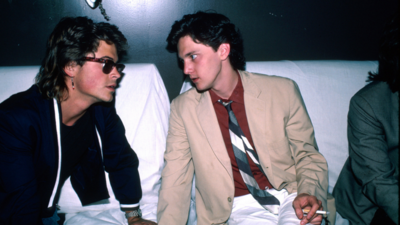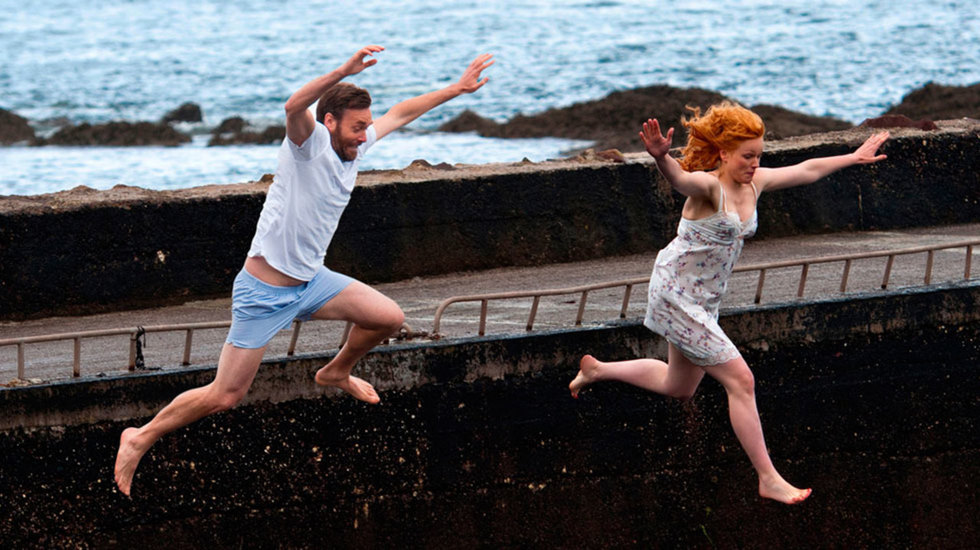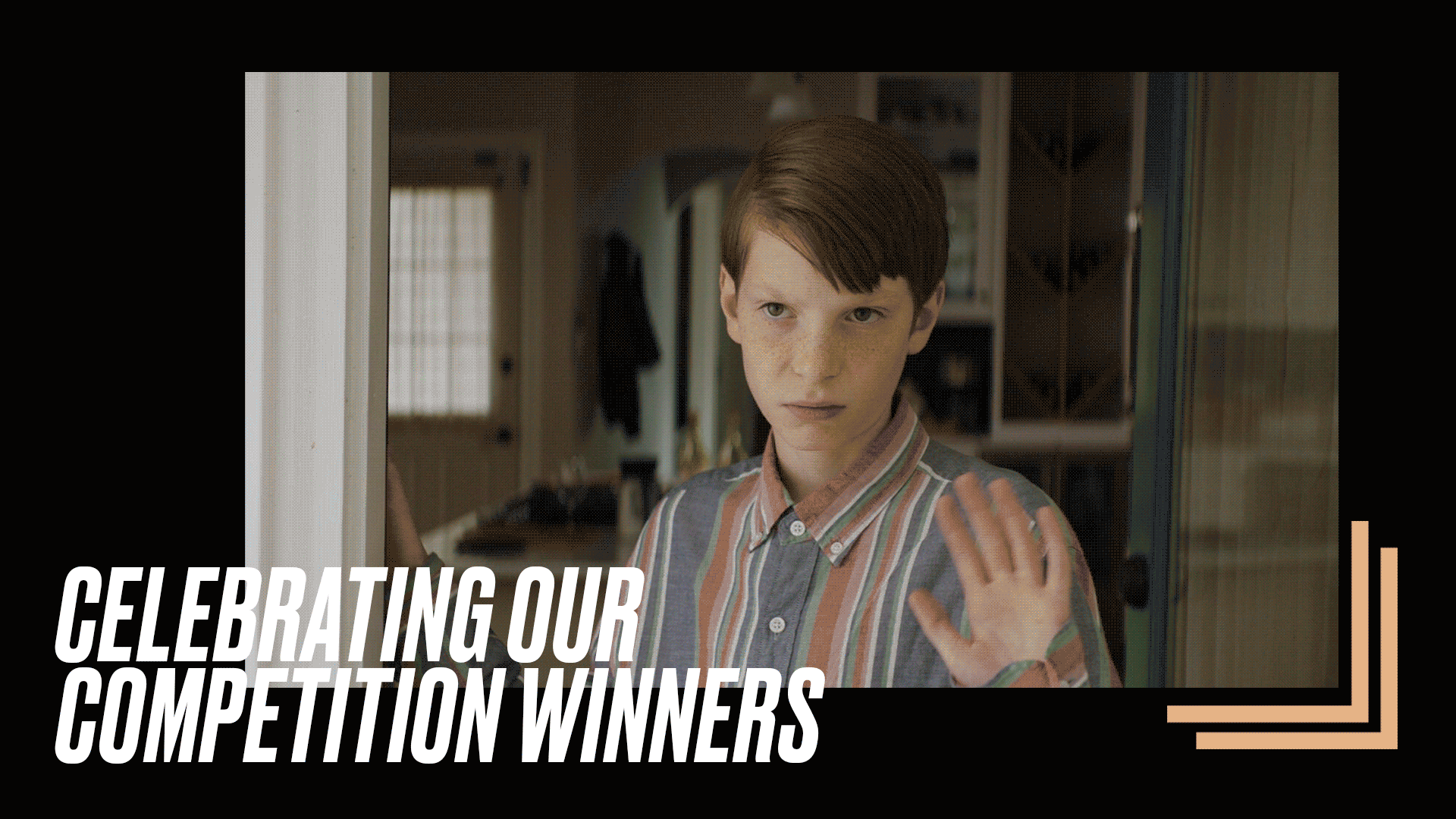
BY KAREN KEMMERLE |
Steph Green, Maxine Peake, Edward MacLiam, and Will Forte on ‘Run and Jump’
Co-writer and director, Steph Green, and the delightful cast of ‘Run and Jump’ sat down with us to talk about the film, their characters, and to share a few choice words about their fearless leader.

Tribeca: Run and Jump recently celebrated its world premiere at TFF 2013. Can you describe the feeling?
Steph Green: First of all, it’s just great to walk into a movie theater and see your movie.That’s an amazing feeling. A lot of family, friends and supporters were there, so we had a packed theater. They were actually turning people away—I even had a couple of friends who couldn’t get in. So it was really sad and tense, but then you’re secretly going, “Oh my god they got turned away!” [laughs] Plus, we didn’t have any walkouts, apparently industry-speak for people staying through the film. We’d never showed the film to a real audience before. It was incredibly thrilling.

Tribeca: While the movie is about a family dealing with a patriarch who is no longer able to function in that role, it is really funny despite the serious subject matter. Were you consciously controlling the tone of the script while writing with Aibhe Keogan? And where did the overall idea for this film spring from?
SG: Well, the genesis of the film definitely started with the original writer, whose name is Aibhe Keogan. Her father suffered a brain injury, so she watched her mother cope with a new version of dad, of her husband. She gave birth to the idea, and then together, we refined this additional storyline of the American doctor coming in and observing, adding yet another dynamic to the crisis that this family was in. So that’s where the story came from.
Because it was such a crisis situation, we were all working to not let it become flat-line sentimentality, or a traumatic experience for the audience. Visually, we kept the movie bright and warm, and we tapped into the reality of the day-to-day life because we all joke about our sorrows. We naturally marry joy and sorrow together.
Tribeca: Maxine, you play such a remarkable character. In the face of her husband’s stroke and sudden behavioral change, Venetia remains the chipper pillar of strength for her entire family. She’s even calm when her husband bashes their gay son and causes these commotions all over town. Can you discuss how you prepared to play this multi-faceted character?
Maxine Peake: I think it was Steph’s vision really. I originally thought to myself, “Okay, this is a woman of grief and trauma, so there’s a lot of leaking of tear ducts.” Steph was adamantly against that, even thought you typically win awards for crying. [laughs] Steph made me see that the story is really about how people deal with grief. That’s why I think the film is so brilliant.In reality, people tend not to deal with directly with grief.
People cry a lot in films—actors like to cry—but to show an emotion is a big deal for the average civilian, and we sort of forget that. Venetia buries that grief because she’s a selfless person with a family to look after, but she still carries it with her. If I had stayed with my original instincts, the film would have turned into some maudlin mess, [laughs] and no one really would have really wanted to have watched me snot my way through it.
Life is short, and you want to work with talented people who deserve to be seen and who will make it an enjoyable experience.
Tribeca: And Edward: No doubt that you did a lot of research as you tackled the challenging role of playing a man who is brain damaged after suffering a stroke. Can you talk about that process?
Edward MacLiam: Well, at first, Steph provided me with some material from different neurologists just describing the different types of strokes and thing like that. I had that as a frame of reference. Plus, my own father died about ten years ago.He had a brain tumor and he suffered a stroke prior to that. So I had some understanding of what Conor was like in terms of his silence and his difficulty with communicating. I also I went to the National Rehabilitation Center in Dunleary to visit a friend of mine with a very severe brain injury.
SG: Ed was so brave because he refused to get trapped in his own head. [To Ed] I think that your bravery in going for it was what I was so grateful for. I wanted them to feel totally free. Ed would decide and tell us, “At this particular moment, I’m focusing on the salt shaker.” He could do that for a five-minute scene and stay interesting, which is quite a feat.
Tribeca: Will, I know you’re going to get this a million times today – but this role is really a big departure for you. What drew you to Steph’s script. And [to Steph] how did you know that Will was your Ted?
Will Forte: The script was just beautiful, and it’s obviously so different from anything I’ve done or gotten a chance to do. I was not sure that I could do the character, but Steph was pretty insistent and confident in me in a way that I wasn’t confident in myself. She jus lured me in. I’m really happy that she did because it was such a wonderful experience and so different.
SG: It’s just intuition. I had seen a lot of Will’s work and I just thought he was a good actor. I knew he was a guy that was naturally thoughtful, sensitive, and detail-oriented. I saw Ted. We had this bizarre courting process because we were both unsure of what the other wass thinking. It’s almost like a first, second, third date scenario of courting each other.
WF: I was scared. It’s a scary thing to try something new.
SG: But you did it anyway!

Tribeca: Obviously, the film is very performance-driven, and you all give wonderful performances. So, a question for everyone, if you had to pick one word to describe Steph as a director, what would that be and why?
EM: Napoleonic.
[Everyone laughs]
SG: That means I’m short and bossy?
MP: Visionary.
WF: That’s really good.
SG: It’s three syllables—no, it’s four syllables.
WF: I don’t know, confident? There’s so many words. Visionary sounds great.
SG: You called me nurturing earlier today. I liked that.
WF: There’s so many things. Overall, Steph knew exactly what she wanted, and sometimes she had us do things that we didn’t know would fit into the overall story line. Then when you see the finished film, you go, “Oh that’s why I had to stare off out the window.” It’s so nice to work with somebody who knows exactly what they want. That confidence that she has in the story bleeds into you.
SG: Ed, you have to go again.
EM: [laughs] Oh, there are lots of words I’d used actually. Generous is one. She was hugely generous throughout the process.
SG: I didn’t mean to ask for more compliments, I just was thinking about it.
Tribeca: So how did you approach to working with this talented ensemble?
SG: My approach is working with wonderful actors.
MP: Oh, come on…
SG: No, it’s true! It’s actually true. I think that one asshole can ruin an entire movie experience. I know that really difficult actors can be fantastic in films, but at the moment, I feel like the experience is too important. I feel like I will be spending years making movies. Life is short, and you want to work with talented people who deserve to be seen and who will make it an enjoyable experience. So that’s where I start. Once I have a script, that’s where I start: Who is going to do this with me? Who can I recruit? That’s why this is such a disgusting love-fest.
[Everyone laughs]
We naturally marry joy and sorrow together.
Tribeca: And you can tell, honestly, that this was a big labor of love. How long was the shooting process? And did you have any rehearsal time?
SG: Yes, we had five days of rehearsal, and we sort of did a mix and match of who came and when, so nobody got exhausted. We built the relationships up slowly. In total, we shot for 26 days. We had a couple of really grueling night shoots because we were shooting during a few of the longest days in Ireland andthere were only about four hours of darkness.
Actually, there were many scenes in the movie that were supposed to be at night, but I had to turn them into day. For example, the barbecue party was a daytime shoot, even though they had already been to the zoo that day. So that was one of the challenges.
WF: They left for the zoo at seven in the morning.
SG: After you ran into Tara on the street, right?
EM: Yeah, Jesus. That was a very, very long day.
MP: I never thought about it. The kids were good sports.
Tribeca: Speaking of great performances, Brendan Morse was really great. His character had to deal with his father’s visceral reaction to his homosexuality, and the relentless bullying from his peers. So can you talk about working with him?
EM: I just thought he was great. He took it all in stride, which I really admired. He’s just a lovely kid.
MP: That’s where you learn a lot from the younger actors because they are really in the moment, aren’t they? Steph will talk them through it and they just do it. I think sometimes we think too much. There are moments where you watch the youngsters and you go “Wow.”
People always say “Oh, well you must learn so much from the older actors,” but I always think it’s the youngsters. They are so open. We overcomplicate it sometimes. When we weren’t shooting, we were like a family would be, giggling and laughing and singing...
SG: “Come on, get off the couch, you’re in a scene.”
WF: They were so good, and so natural. Everything was so new to me and I had learned so much from these guys: from Maxine and Ed, and from Brendan and Kira (who plays Conor and Maxine’s Daughter). To just watch them effortlessly act was inspiring. It’d be like “Hey, these are kids and they’re acting better than me!” [Laughs]

